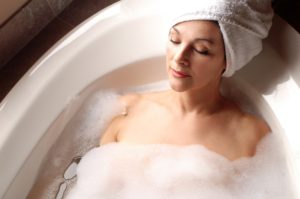
Biomedical engineers have found that taking a bath in water of about 104–109 degrees can go a long way to get better shut-eye. To gather the information for this study, a systematic review protocol was used. This is a method used to search for and analyze relevant data from previous studies.
In collaboration with the UT Health Science Center at Houston and the University of Southern California, 5,322 studies were used, linking water-based passive body heating or bathing and showering with warm/hot water to sleep quality. Researchers extracted information from publications meeting predefined boundaries to explore the effects of water-based passive body heating on a number of sleep-related conditions. These conditions included sleep onset latency, the length of time it takes to fall asleep; sleep efficiency, the amount of time spent asleep relative to the total amount of time spent in bed intended for sleep; total sleep time, and subjective sleep quality.
Meta-analytical tools were used to assess the consistency between the thousands of studies that showed an optimum temperature of between 104 and 109 degrees Fahrenheit and improved overall sleep quality. They found that taking a bath one-to-two hours before bedtime can improve the speed of falling asleep by an average of 10 minutes.
Circadian Clock
While there have been many studies to support the link between water-based body heating and sleep quality in the past, this study was the first to look at optimal timing of bathing before bedtime and how it relates to the body’s biological process. It is understood that both sleep and our body’s core temperature are regulated by a circadian clock located within the brain’s hypothalamus that drives the 24-hour patterns of the body’s biological process, including sleep and wakefulness.
Body temperature is involved in the regulation of the sleep/wake cycle which exhibits a circadian cycle, being 2-3 degrees Fahrenheit higher in the late afternoon/early evening than during sleep when it is the lowest. About an hour before usual sleep time, the body’s core temperature has a reduction by about 0.5 to 1 F and drops to its lowest level between the middle and later span of nighttime sleep. It then begins to rise as the morning comes. This temperature cycle leads the sleep cycle and is an essential factor in achieving the highest sleep quality.
The conclusion of the study showed that the optimal time for taking a bath or shower in the evening is 90 minutes before bedtime in order for the body’s circadian rhythm to cool the core temperature down and prepare it for the night cycle.
The research team is now working with UT’s Office of Technology Commercialization where they are designing a bed system with UT-patented Selective Thermal Stimulation technology. This will be the first bed of its kind to have duel temperature zone controls that can be tailored to maintain an individual’s optimum temperature throughout the night.